The NIH Summer Internship Program (SIP) provides an opportunity to spend a summer working at NIDCD, side-by-side with some of the world’s leading researchers in auditory neuroscience. In addition to the general SIP umbrella, a number of subprograms are designed to enhance the diversity of the biomedical workforce or the types of research being performed within NIH labs.
Trainees may apply directly to the SIP or to any specific subprogram, including: the Community College Summer Enrichment Program (CCSEP), the College Summer Opportunities to Advance Research (C-SOAR), the Amgen Scholars Program at NIH, the Graduate Summer Opportunity to Advance Research (G-SOAR), or the Graduate Data Science Summer Program (GDSSP).
To read more about NIDCD/NIH internships and apply, visit the Office of Intramural Training and Education summer internship page.
See below to learn more about NIDCD’s summer interns.
2024 Summer Interns
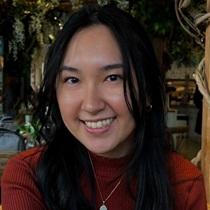
Institution: University of Maryland, College Park
Career Level: Undergraduate
NIDCD Mentor and Laboratory: Michael Hoa, M.D., Auditory Development and Restoration Program, and Gayla Poling, Ph.D., Auditory and Vestibular Clinical Research Section
Research Summary: I am a senior studying hearing and speech sciences at UMD College Park. I am currently a research assistant to Dr. Matthew Goupell, working in psychoacoustics research. After completing my undergraduate degree, I plan to pursue a doctor of audiology (Au.D.) degree. This summer, I explored middle ear function in patients with hearing instability. I characterized the multifrequency tympanometry measures of these patients, grouped by identification of endolymphatic hydrops, and compared these measures to those of healthy volunteers.
Why did you decide to apply for the internship or award?
I was drawn to the clinical research at NIDCD. It allowed me to apply my current audiological knowledge each day, and to deepen my understanding through exposure to new discoveries in hearing science.
What did you gain from the experience?
I gained extensive knowledge of the middle ear system and vestibular function. I also gained invaluable knowledge about patient service from the wonderful NIDCD and NIH Clinical Center audiologists.
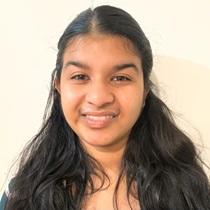
Institution: Rensselaer Polytechnic Institute (RPI)
Career Level: Undergraduate
NIDCD Mentor and Laboratory: Christina (Yein) Park, Section on Sensory Physiology and Biophysics
Research Summary: I am currently a rising junior majoring in computational biology at RPI. I’m intrigued by the intricacies of the human body, especially from the perspective of biophysics. I had the opportunity to be a summer intern at the Section on Sensory Physiology and Biophysics, where I was able to explore the scramblase activity of TMC1/2 ion channels. Specifically, I explored whether the N-terminal tag of the TMC proteins affected their scramblase activities.
Why did you decide to apply for the internship or award?
I decided to apply for this internship because I wanted to gain further insight into functional biophysics techniques.
What did you gain from the experience?
I was happy to be a part of the amazing lab family of Dr. Angela Ballesteros. I’m super thrilled and happy to have learned and performed a variety of experiments, including reconstituting liposomes for the scramblase assay.
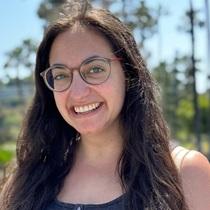
Institution: University of Southern California
Career Level: Predoctoral
NIDCD Mentor and Laboratory: Nadia Biassou, M.D., Ph.D., The Integrative Neuroscience of Communication Unit
Research Summary: Dr. Nadia Biassou’s lab examines language processing using computational modeling and neural and behavioral experiments. I tested the stimuli for a planned study on speech perception in noise to finalize the study’s procedure. I also conducted and presented literature reviews on relevant topics to inform the experimental design and predictions.
Why did you decide to apply for the internship or award?
I wanted to conduct research outside of my Ph.D. program to gain experience in a related but distinct field of study, and to decide what type of research career I want to pursue.
What did you gain from the experience?
I gained experience in neuroscience research and experimental design. I also used the resources NIH offers to receive advice on my resume from a career counselor and gain technical skills from library classes.
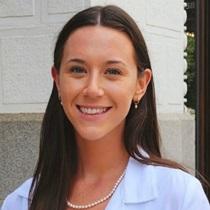
Institution: University of Maryland
Career Level: Medical student
NIDCD Mentor and Laboratory: Joshua M. Levy, M.D., M.P.H., M.S., Sinonasal and Olfaction Program and NIH’s National Smell and Taste Center
Research Summary: I focused on producing a narrative review of all available olfactory tests as well as an international survey for smell and taste centers. These projects were in conjunction with the opening of the NIH’s National Smell and Taste Center. My work was primarily to gather information that would support this opening.
Why did you decide to apply for the internship or award?
I am interested in pursuing otolaryngology as a specialty and thought there was no better way to learn more about the field than contributing to research and learning from a top doctor.
What did you gain from the experience?
I am more knowledgeable about the fields of rhinology and otorhinolaryngology. I am familiar with the tools used in clinics, common diagnoses, and the latest research projects.
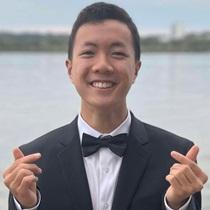
Institution: University of Virginia
Career Level: Undergraduate
NIDCD Mentor and Laboratory: Holly Beaulac , Ph.D., Israel Hernadez Rivera, and Kirupa Suthakar, Ph.D., Section on Neuronal Circuitry
Research Summary: This summer, I aimed to label chloride cotransporter proteins in the mouse cochlea and brainstem using immunohistochemistry. Our lab recently demonstrated the presence of GABA-mediated synapses in the cochlea, and the natural next step was to examine and understand how the activity of GABA might shift throughout maturation. Staining for chloride transporters allowed me to tackle a piece of that question. My experiments indicated that inward chloride transporters were expressed before the onset of hearing, and outward chloride transporters were expressed after the onset of hearing. This evidence suggests that the activity of GABA does indeed shift as the cochlea develops.
Why did you decide to apply for the internship or award?
As I approached this summer, I had a very foggy sense of what I wanted to do after college and beyond. By spending time at NIH, I hoped to clear some of that uncertainty by meeting and hearing from people with diverse scientific and personal backgrounds.
What did you gain from the experience?
This summer has been, without question, one of my most formative academic experiences to date. NIH—and particularly NIDCD—is filled with vibrant people and even more vibrant ideas, and it has been my sincere privilege to learn alongside such thoughtful and engaged people.

Institution: University of Texas at San Antonio
Career Level: Undergraduate
NIDCD Mentor and Laboratory: Matthew Ingersoll, Ph.D., Neurotology Branch
Research Summary: I am an undergraduate student pursuing a B.S. in neuroscience. I had the opportunity to work in Dr. Ronna Hertzano’s lab this summer. I studied acquired hearing loss and pharmacological intervention. I was trained in auditory brainstem response (ABR), distortion product otoacoustic emission (DPOAE), data analysis for ABR/DPOAE, cochlear dissections, and more.
Why did you decide to apply for the internship or award?
I decided to apply for the Summer Internship Program (SIP) at the National Institute on Deafness and Other Communication Disorders due to the incredible strides in auditory research that this community has accomplished through the years. I wanted to gain as much knowledge as possible.
What did you gain from the experience?
I learned from my principal investigator (PI) and from everyone in the lab how powerful mentorship can be. Having a strong network of intelligent and compassionate individuals who are not only there to help you grow professionally, but also as a person, was crucial to my success in learning this summer.
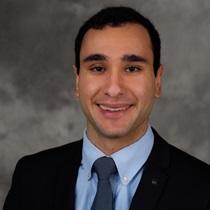
Institution: Rutgers New Jersey Medical School
Career Level: Medical student
NIDCD Mentor and Laboratory: Michael Hoa, M.D., Auditory Development and Restoration Program
Research Summary: I am a medical student who engaged in two research projects this summer in Dr. Michael Hoa’s lab. For the first project, I used single cell analysis in Python to analyze murine cochlear transcriptomic developmental datasets. For the second project, I created discrimination threshold plots to scrutinize electrocochleography area and amplitude ratio clinical data.
Why did you decide to apply for the internship or award?
I applied for the summer internship to grow my computational and laboratory research skills while learning from amazing mentors and from courses offered by NIDCD, including EARssentials.
What did you gain from the experience?
I developed a deeper understanding of auditory system development and inner ear anatomy, function, and pathology while also gaining exposure to audiometric and vestibular testing and utricle dissections.
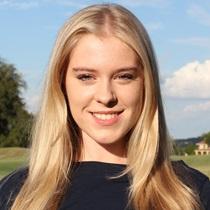
Institution: The University of Texas at Austin
Career Level: Undergraduate
NIDCD Mentor and Laboratory: John Lee, Au.D., Ph.D., Section on Sensory Cell Biology (Laboratory of Hearing Biology and Therapeutics)
Research Summary: I am a rising senior pursuing a B.S. in neuroscience and a B.S. in speech, language, and hearing sciences. My research areas of interest are audiology and sensory neuroscience. This summer, my project aimed to identify the mechanisms by which statins, a class of cholesterol-lowering drugs, confer protection against cisplatin-induced hearing loss (CIHL). Using a genetically modified mouse model of low cholesterol, we investigated whether reducing cholesterol is a primary mechanism by which statins are protective against CIHL.
Why did you decide to apply for the internship or award?
I wanted to spend my summer at NIDCD because of the phenomenal opportunities for hearing research at basic science, translational, and clinical levels. I knew that the mentorship and opportunities in this institute would be excellent.
What did you gain from the experience?
I learned important translational research techniques as well as the process of conducting a pilot study. This experience opened my eyes to the many opportunities and techniques that exist in hearing research.
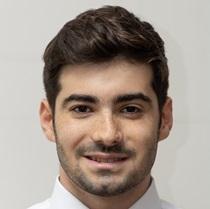
Institution: Colgate University
Career Level: Undergraduate
NIDCD Mentor and Laboratory: Tessa Sanders, Ph.D., Section on Developmental Neuroscience
Research Summary: I am an undergraduate student who researched cochlear development this past summer and will continue into the fall semester with Colgate University’s Bethesda Study Group. My work focuses on the molecular signaling involved with SGN subgroup specification, such as FGF3/10 signaling. Conducting in situ hybridization, I quantified changes in gene expression due to FGF inhibition that affect the composition of the SGN subtypes present. After a productive semester of research and graduating from Colgate next year, I plan to apply to medical school.
Why did you decide to apply for the internship or award?
As I was accepted to conduct my senior research in Dr. Matt Kelley’s lab at NIDCD, I applied to begin my research in the summer so that I could maximize productivity in the fall, build a framework of knowledge about my research project, and get to know the scientists in my lab.
What did you gain from the experience?
The Summer Internship Program (SIP) was a valuable summer research experience for me. From the one-on-one learning with my mentor to the informative EARssentials seminars and lab sessions, I gained considerable knowledge of laboratory procedures and different aspects of the cochlea, all while connecting with the accomplished professional scientists in my lab.
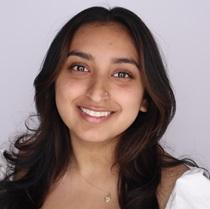
Institution: Vanderbilt University
Career Level: Undergraduate
NIDCD Mentor and Laboratory: Prestina Smith-Davidson, Ph.D., Sinonasal and Olfaction Program
Research Summary: My summer research project focused on characterizing nasal epithelial cells to determine if olfactory cells are present. These cells are harvested from nasal polyps caused by chronic rhinosinusitis. This project was very meaningful, as chronic rhinosinusitis with nasal polyps is one of the major causes of smell loss. To perform this experiment, I used five cell markers to perform QPCR, and I tested these against a housekeeping gene to validate my results. I was able to find that olfactory cells do appear to be present in our nasal polyp and healthy human tissue samples. Further studies will be necessary to figure out the difference between healthy vs. polyp cell types and to attempt to quantify the presence of olfactory cells.
Why did you decide to apply for the internship or award?
I applied to the NIH summer internship because I wanted to be able to do full-time research over the summer so that I could better my skill set and gain insight into this part of the medical field.
What did you gain from the experience?
I gained valuable skills that will be translated into my future research. I was also able to form meaningful relationships with my research team and mentors.
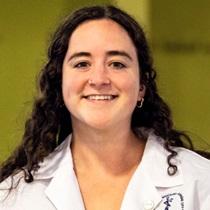
Institution: University of Missouri-Kansas City School of Medicine
Career Level: Predoctoral
NIDCD Mentor and Laboratory: Elizabeth Driver, Ph.D., Section on Developmental Neuroscience
Research Summary: As a medical student, I am drawn to otolaryngology due to its unique combination of both immediate surgical interventions that can quickly improve a patient’s quality of life and long-term patient relationships. My goal is to become a clinician who practices medicine and drives research advancements in the field. In Dr. Matthew Kelley’s lab, I focused on cochlear development. The cochlea can be dissected from mice in utero and continue growing in vitro as explants. I explored the potential of transfecting these explants with viruses to knock down candidate genes. This would be a very efficient way to silence genes and discover the transcriptional pathways leading to the intricate patterning of the cochlea.
Why did you decide to apply for the internship or award?
I hope to become a clinician who can critically analyze current medical research and contribute to the scientific discoveries in my field. NIH seemed like a perfect place to be to work towards that goal, and Dr. Matthew Kelley, Dr. Elizabeth Driver, and the entire lab were very welcoming.
What did you gain from the experience?
I met knowledgeable scientists and clinicians who helped me develop skills and expand my understanding of the research process and the workings of the inner ear. NIDCD has labs studying a myriad of topics, and I learned from investigators from many disciplines.
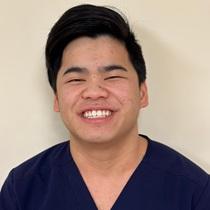
Institution: Rutgers University-New Brunswick
Career Level: Undergraduate
NIDCD Mentor and Laboratory: Holly Beaulac, Ph.D., Israel Hernadez Rivera, and Kirupa Suthakar, Ph.D., Section on Neuronal Circuitry
Research Summary: I am an undergraduate at Rutgers University. I worked as a summer intern in Dr. Catherine Weisz’s lab. I focused on using immunohistochemistry to locate efferent synapses and the presence of GAD, a neurotransmitter that regulates GABA, in the cochlea of mice. Specifically, we looked at how GABA synthesis plays a role in development and maturation.
Why did you decide to apply for the internship or award?
I applied to this internship because I knew it would expand my research and lab knowledge. I have sensorineural hearing loss in my right ear, so I was really interested in learning more about the work of auditory laboratories.
What did you gain from the experience?
I learned so much about the auditory system and research in general from this internship. From dissecting cochlea and immunohistochemistry to making and presenting a scientific poster, I gained so much useful knowledge.
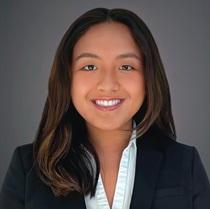
Institution: University of California, Davis, School of Medicine
Career Level: Predoctoral
NIDCD Mentor and Laboratory: Julie Christensen, Auditory and Vestibular Clinical Research Section
Research Summary: I received a bachelor’s degree in physiological sciences from the University of California, Los Angeles, where I first became curious about sensory processing and perception. Currently, I am a medical student at the University of California, Davis, with a strong interest in otolaryngology, particularly in disordered hearing processes. This summer, I had the opportunity to characterize hearing loss in patients with osteogenesis imperfecta (OI) in the lab of Dr. Gayla Poling. The insights gained from this research will be instrumental in guiding the evaluation and management of hearing in individuals with OI.
Why did you decide to apply for the internship or award?
As an aspiring physician-researcher, I couldn’t imagine a better place to grow as a scientist than NIDCD and the NIH Clinical Center.
What did you gain from the experience?
It was a privilege to engage with and learn from leading researchers. This summer internship deepened my appreciation for the complexities of hearing disorders and solidified my aspiration to become a physician-researcher.
2023 Summer Interns
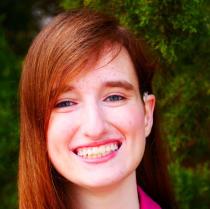
Institution: University of Texas at Dallas
Career Level: Undergraduate
NIDCD Mentor and Laboratory: Katharine Fernandez, Au.D., Ph.D., Laboratory of Hearing Biology and Therapeutics
Research Summary: I am a rising senior at the University of Texas at Dallas, where I am studying speech-language pathology and audiology. This was my second summer with NIDCD. This year, I explored age-related hearing loss and ways to slow the onset of this type of hearing loss.
Why did you decide to apply for the internship or award?
NIDCD is one of the few places with a "bench to bedside" focus in the area of hearing sciences. This focus is what attracted me to NIDCD, as it aligns with my future career goals.
What did you gain from the experience?
I learned how to be a better science communicator and gained a deeper understanding of techniques for working with big data.
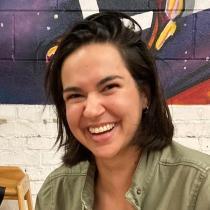
Institution: University of Maryland School of Medicine
Career Level: Predoctoral
NIDCD Mentor and Laboratory: Kathleen Gwilliam, Ph.D., Neurotology Branch
Research Summary: I am a student at the University of Maryland School of Medicine, where I began working in the laboratory of Ronna Hertzano, M.D., Ph.D., before the lab’s relocation to NIDCD. I completed a dual degree in musical arts and business administration at Vanderbilt University and performed as principal violist of the West Texas Symphony before completing a postbac and applying to medical school. My life as a musician is closely connected to my research interest in hearing loss, particularly future regenerative therapies. This summer, I studied the role of transcription factors involved in ciliogenesis in cochlear and vestibular hair cell development and function.
Why did you decide to apply for the internship or award?
I had heard NIDCD described as “Disneyworld for science,” and I was excited to spend a summer surrounded by so many talented scientists tackling big issues in the inner ear from the vantage points of diverse disciplines.
What did you gain from the experience?
I learned something new every single day at NIDCD/NIH, and the broader view of the context of my research area helped me think more creatively.
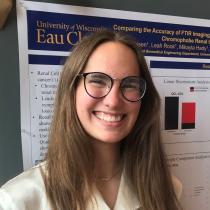
Institution: University of Wisconsin-Eau Claire
Career Level: Undergraduate
NIDCD Mentor and Laboratory: Elizabeth Cebul, Ph.D., Section on Sensory Cell Development and Function
Research Summary: My research focused on the supporting cell responses to hair cell damage. The experiments used a zebrafish lateral line model that was genetically modified with a supporting cell-specific calcium indicator to allow for in vivo imaging. To narrow the focus of the study, we also used a model with a p2ry1 mutation to identify the role of ATP and this purinergic receptor in the response mechanism. The overall goal of this research was to determine the mechanism and functional significance of supporting cell damage responses.
Why did you decide to apply for the internship or award?
I pursued this internship because it would provide me with the opportunity to work in the field that I hope to continue in during the rest of my career. It would also allow me to connect with successful scientists in an environment outside of a university.
What did you gain from the experience?
During this experience, I experimented with many techniques that I had not worked with before. This was both challenging and informative. I also gained a better understanding of troubleshooting methods and other universally relevant research skills such as experiment planning, literature searches, and networking.
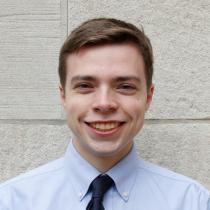
Institution: Sidney Kimmel Medical College at Thomas Jefferson University
Career Level: Medical student
NIDCD Mentor and Laboratory: Katharine Fernandez, Au.D., Ph.D., Laboratory of Hearing Biology and Therapeutics
Research Summary: I am a medical student who is interested in practicing as a clinician-scientist within the field of otolaryngology. Specifically, I am interested in factors that change our ability to hear and balance. In the lab of Lisa Cunningham, Ph.D., I was involved in both clinical and translational research. Clinically, I evaluated ototoxicity in new immunotherapy drugs, specifically PD-L1 inhibitors for head and neck cancer patients. Translationally, I was involved in designing a tumor-bearing mouse model of cisplatin- induced hearing loss and potential therapeutic targets.
Why did you decide to apply for the internship or award?
NIDCD has amazing mentors and resources for students interested in hearing research. They also provide the opportunity to learn from and collaborate with many different experts in the field.
What did you gain from the experience?
I had great mentors who showed me how clinician- scientists conduct the bench-to-bedside process. I also learned valuable research skills and techniques that will further advance both my clinical and scientific training.
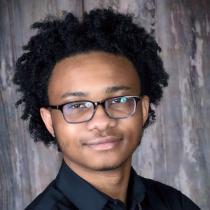
Institution: University of Connecticut
Career Level: Undergraduate
NIDCD Mentor and Laboratory: Zhengchang Lei, Ph.D., Section on Sensory Cell Development and Function
Research Summary: I was an NIH High School Scientific Training and Enrichment Program (HiSTEP) 2.0 summer intern working at NIDCD in the Section on Sensory Cell Development and Function. Over the summer, I worked with my mentor, Zhengchang Lei, to figure out if there are subtypes of afferent neurons in zebrafish. I gained knowledge and experience in the lab, and I got to explore the auditory system in great depth. Through my research, I concluded that zebrafish do have subtypes of afferent neurons. I hope that this information can generate new pathways for research in NIDCD-related fields.
Why did you decide to apply for the internship or award?
I applied for this internship because my dream career has been to work in a lab as a biomedical engineer. This seemed like a great opportunity to test it out.
What did you gain from the experience?
During my internship, I got a strong feel for what life and community is like in a lab. Doing real research with actual scientists was a very valuable experience.
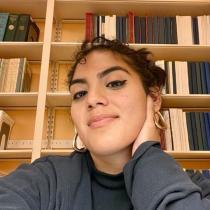
Institution: Colgate University
Career Level: Undergraduate
NIDCD Mentor and Laboratory: Beatrice Mao, Ph.D., Section on Developmental Neuroscience
Research Summary: In the Section on Developmental Neuroscience, we investigated how disruption of Pou4f3 expression impacts the morphology and function of hair cells in the utricle. We attempted to characterize the mechanotransduction activity of these Pou4f3 mutant hair cells, and to determine whether insertion of the diphtheria toxin transgene in a widely used mouse line (Pou4f3-DTR) results in partial or complete knockdown of Pou4f3 expression.
Why did you decide to apply for the internship or award?
I was curious to experience the research environment in a renowned institution in order to help me decide on my post-college career plan.
What did you gain from the experience?
As a summer intern, I experienced the collaborative and welcoming environment of working in a lab and also gained experience with new techniques.
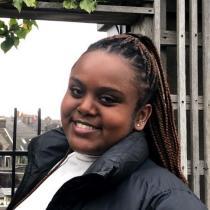
Institution: Emory University
Career Level: Undergraduate
NIDCD Mentor and Laboratory: Israel Hernandez Rivera, Section on Neuronal Circuitry
Research Summary: I am a rising senior at Emory University, double majoring in English and neuroscience and behavioral biology (NBB). My intent is to pursue an M.D./Ph.D. Two years ago, I was a summer intern in NIDCD’s Section on Neuronal Circuitry through the NIH College Summer Opportunities to Advance Research (C-SOAR) program. Continuing my journey in the Section on Neuronal Circuitry, now via the NIH Undergraduate Scholarship Program (UGSP), I investigated the presence and understanding of the function of GABAergic signals between the medial olivocochlear (MOC) and Type II fibers in the outer spiral bundle of the cochlea. In particular, my focus was on using immunohistochemistry and cochlea dissections to create a protocol for labeling MOC (Medial Olivocochlear) terminals and glutamate decarboxylase in both wildtype and ChAT IRES Cre mouse models. The objective was to evaluate the expression of Cre in the cochlea for this specific Cre line.
Why did you decide to apply for the internship or award?
I applied for the UGSP because I wanted to continue gaining scientific skills and knowledge as well as engaging in full-time research.
What did you gain from the experience?
My internships at NIDCD exposed me to opportunities within the research field and honed my scientific and professional skills. I learned a lot about auditory neuroscience research in general, and I gained lifetime mentors.
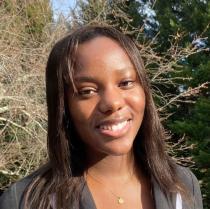
Institution: New York University
Career Level: Undergraduate
NIDCD Mentor and Laboratory: Cathy Sung, Ph.D., Laboratory of Hearing Biology and Therapeutics
Research Summary: I have studied hearing loss in the lab of Lisa Cunningham, Ph.D., for the past three summers. During my first two summers, I conducted immunostaining protocols and cultured cochlear utricles. This summer, I am assisting with tumor research. While at NYU, I work as a student intern at NYU Langone Health’s Neuroscience Institute, where I have been trained to handle more than 20 rats and aid these animals in their sugar water tasks every week.
Why did you decide to apply for the internship or award?
I applied to expand my understanding of the basis of medicine. Although I will be attending medical school, wet lab experience is paramount in all aspects of health care.
What did you gain from the experience?
I gained wet lab experience and sharpened my technique with handling animals.

Institution: University of Maryland, Baltimore County
Career Level: Postbaccalaureate
NIDCD Mentor and Laboratory: Cathy Sung, Ph.D., Section on Sensory Cell Biology (Laboratory of Hearing Biology and Therapeutics)
Research Summary: This summer, I investigated the impact of cisplatin, a powerful anticancer drug known for causing substantial hearing loss. Recent findings suggest that eliminating immune cells called macrophages within the cochlea may contribute to the prevention of hearing loss associated with cisplatin. Thus, my focus was on understanding the effects of cisplatin on cochlear macrophages to gain deeper insights, potentially paving the way for future treatments and therapies aimed at reducing the risk of hearing loss in cancer patients.
Why did you decide to apply for the internship or award?
I wanted to explore a field of research that genuinely interests me. I knew this opportunity would allow me to acquire extensive knowledge and valuable new skills.
What did you gain from the experience?
I developed new lab skills such as immunofluorescence staining and imaging. I also gained knowledge about the inner ear.
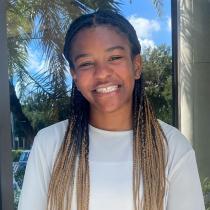
Institution: High Point University
Career Level: Undergraduate
NIDCD Mentor and Laboratory: Julie Christensen, M.S., NIDCD Audiology Unit, and Michael Hoa, M.D., Auditory Development and Restoration Program
Research Summary: I am currently an undergraduate student at High Point University, where I am majoring in biochemistry and sociology/anthropology. I have a deep interest in clinical research because it provides the opportunity to work with and learn from patients while being in the forefront of medical innovation. This summer, I researched hearing instability conditions, particularly Ménière’s disease, and their effect on the integrity of the cochlea. I investigated the viability of DPOAE phase shift testing as an audiometric measure to serve as a biomarker and diagnostic tool in identifying fluctuating hearing loss. Results from this study may allow us to better understand cochlear function in ears with hearing instability in relation to body tilt.
Why did you decide to apply for the internship or award?
I applied to the NIH College Summer Opportunities to Advance Research (C-SOAR) program to engage in prestigious biomedical research and develop proficiency in scientific communication. Moreover, I hoped to hone my skills as a scientist and learn how we can enhance scientific research with diverse viewpoints.
What did you gain from the experience?
I learned the inner workings of a successful clinical unit and deepened my understanding of audiological processes. This summer was amazing because it provided the perfect intersection of my research interests and future goals. I loved working in the Audiology Unit and I’m excited to continue to contribute to the research world.
2022 Summer Interns

Institution: University of Texas at Dallas
Career Level: Undergraduate
NIDCD Mentor and Laboratory: John Lee, Ph.D., and Kate Fernandez, Au.D., Ph.D., Laboratory of Hearing Biology and Therapeutics
Research Summary: I explored the onset and the progression of cisplatin-induced hearing loss while working at the Hearing Therapeutics and Biology Lab. Cisplatin, a highly effective chemotherapy medication, is also toxic to the inner ear. My work focused on understanding what risk factors may influence the onset of a cisplatin-induced hearing loss in addition to exploring whether or not adults experience progressive cisplatin-induced hearing loss.
Why did you decide to apply for the internship or award?
I have had a longstanding passion for research, with a desire to serve those who are deaf or hard of hearing. This made the summer internship program with the NIDCD the perfect opportunity for me!
What did you gain from the experience?
This internship really opened up my eyes to the innumerable career paths within our field. I also learned new research skills that I hope to use in future endeavors.
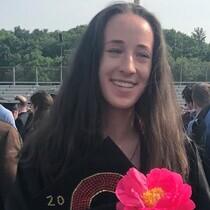
Institution: Colgate University
Career Level: Undergraduate
NIDCD Mentor and Laboratory: Betsy Driver, Ph.D., Laboratory of Cochlear Development
Research Summary: This summer, I researched and learned about development of hair cells in the mouse cochlea. I looked at mice with different genotypes to better understand how alterations at a genetic level can change the phenotype of the Organ of Corti in the cochlea. Furthermore, I participated in quantifying these differences so that our lab may eventually be able to discern the role and importance of specific genes in hair cell development.
Why did you decide to apply for the internship or award?
I have always been interested in the concept of research and bench work but have never had access to facilities that would allow me to complete such projects outside of a classroom setting. I was very excited and interested in the possibility of working alongside established scientists so that I could learn in a natural lab setting rather than a graded class.
What did you gain from the experience?
I have a newfound interest in pursuing a career in research after this experience. Not only did I learn more about myself and my interest in bench work, but I feel more excited than ever to continue research after graduation and pursue a higher degree that will enable me to make my own contributions to the scientific community one day.
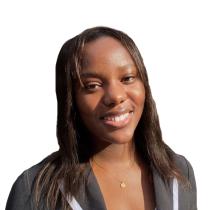
Institution: New York University
Career Level: Undergraduate
NIDCD Mentor and Laboratory: Cathy Sung, Ph.D., Laboratory of Hearing Biology and Therapeutics
Research Summary: My research was focused on identifying two unique macrophage subsets in the mouse cochlea. Macrophages are immune cells, and the lab is interested in their role under cisplatin treatment. This may help advance therapeutic drugs for hearing loss.
Why did you decide to apply for the internship or award?
I applied for the internship a second time because the experience here at the NIH is invaluable and it is nowhere like anything else.
What did you gain from the experience?
I gained core leadership and accountability skills. I also learned scientific jargon.
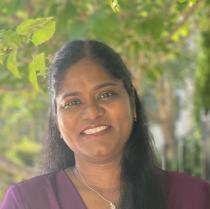
Institution: University of Maryland
Career Level: Graduate student
NIDCD Mentor and Laboratory: Catherine Weisz, Ph.D., and Kirupa Suthakar, Ph.D., Section on Neuronal Circuitry
Research Summary: As a virtual summer intern in the neuronal circuitry section, the majority of the work was focused on data analysis of the electrophysiological data collected from MOC efferent neurons using patch-clamp technique. My research revolved around analyzing the synaptic events that were collected under different conditions during the experiment from a single cell and providing a simple model to detect and identify events on the time series recordings.
Why did you decide to apply for the internship or award?
I decided to apply for this internship in order to give myself exposure to research and apply my data science knowledge to the field. Furthermore, I wanted to enhance the computational skills that I gained through coursework to be translated into the real world.
What did you gain from the experience?
This opportunity enabled me to gain in-depth knowledge in analytics with time series signal recordings. This was my first exposure to research, which allowed me to learn a significant amount of neuroscience, understand the auditory system, read and analyze scientific papers, and practice presentations.
2021 Summer Interns
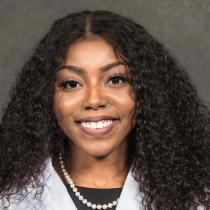
Institution: Southern Illinois University School of Medicine
Career Level: Medical student
NIDCD Mentor and Laboratory: Julie Christensen, M.A., and Carmen C. Brewer, Ph.D., NIDCD Audiology Unit
Research Summary: After receiving my B.A in speech-language-hearing sciences from the University of Minnesota Twin Cities, I joined the NIDCD Audiology Unit, directed by Carmen C. Brewer, Ph.D. I conducted retrospective research on auditory and otologic manifestations in rare diseases and syndromes (such as neurofibromatosis type 1 and relapsing polychondritis) by evaluating peripheral hearing status, middle ear function, and auditory nerve and auditory brainstem transmission characteristics. I also studied otologic assessments and findings in these diseases. Results from these studies may provide a better understanding of auditory and otologic function and manifestations so that patients may benefit from appropriate hearing interventions and improved patient care.
Why did you decide to apply for the internship or award?
As an aspiring clinician-scientist, I wanted to use this internship to expand my knowledge of basic and translational research and of clinical trials related to the prevention and treatment of disease.
What did you gain from the experience?
This internship helped me to hone my research and clinical skills, learn from and collaborate with dynamic experts in the field, and deepen my understanding of auditory and cognitive development in rare diseases.
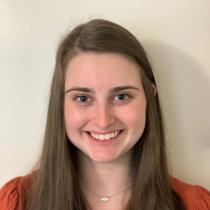
Institution: George Mason University
Career Level: Undergraduate
NIDCD Mentor and Laboratory: Michael Hoa, M.D., Auditory Development and Restoration Program
Research Summary: As a summer intern in the NIDCD, a large portion of my research focused on data analysis of immunostained histology samples of the cochlea. The goal of this research was to develop a novel mouse model for the study of intermediate cells within the stria vascularis. We compared transgene expression to endogenous RNA and protein expression in the cochlea in order to visualize intermediate cells. In the future, we hope to isolate and culture intermediate cells and study their contribution to endocochlear potential generation.
Why did you decide to apply for the internship or award?
I was looking to gain insight into the inner workings of a research lab and develop my own research skills.
What did you gain from the experience?
I learned a lot about the scientific process: initial inquiries, challenges, overcoming obstacles, etc. I experienced how individuals in the lab work together and support each other in order to advance their research.
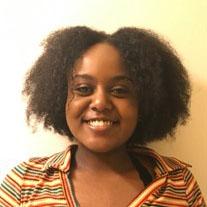
Institution: Emory University
Career Level: Undergraduate
NIDCD Mentor and Laboratory: Sian Kitcher, Ph.D., Section on Neuronal Circuitry
Research Summary: The research I conducted over the summer with Sian Kitcher, Ph.D., was to investigate if GABAergic signaling took place between medial olivocochlear efferent fibers and type II fibers in the outer spiral bundle. I used the gEAR portal to visualize and analyze images to see the presence of GABA on any of the cell types and then used immunohistochemistry to localize GABA on those cell types in the outer spiral bundle.
Why did you decide to apply for the internship or award?
I applied to the NIH College Summer Opportunities to Advance Research (CSOAR) program to develop my scientific communication and networking skills, work on research on a project related to my interest in neuroscience, attend and lead journal clubs, and give poster presentations.
What did you gain from the experience?
This research opportunity was my first exposure to research and working in a lab. I loved the Weisz lab, and I learned that the dynamic of the people in the lab is a big part of the research experience.

Institution: New York University
Career Level: Undergraduate
NIDCD Mentor and Laboratory: Cathy Sung, Ph.D., Section on Sensory Cell Biology
Research Summary: Over the summer, I conducted research involving life-saving therapeutic drugs such as neomycin and cisplatin, which are used in cancer patients. A major side effect of these medications is ototoxicity. My research revolved around taking the utricle of a mouse ear organ and using it ex vivo to analyze hair cells when exposed to these drugs with the addition of a protectant called COPPIX. The purpose of this research is to try to combat the ototoxic effects of these life-saving drugs.
Why did you decide to apply for the internship or award?
I applied for this research internship in order to strengthen my understanding of the work scientists conduct. Especially during this surge of public health awareness, I believe as an aspiring physician that it is important to learn where drugs come from and how these mechanisms can be used to improve society.
What did you gain from the experience?
At NIH, I gained more experience with public speaking via the practice talks we had with staff. Also, I gained a lot of knowledge about how to read and analyze scientific papers, make scientific posters, and use the applications ImageJ and Fiji.
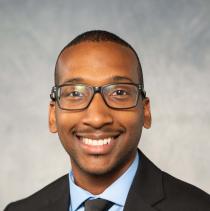
Institution: Howard University College of Medicine
Career Level: Predoctoral Medical Student
NIDCD Mentor and Laboratory: Nyall R. London, Jr., M.D., Ph.D., Sinonasal and Skull Base Tumor Program
Research Summary: Esthesioneuroblastoma is a rare type of cancer of the nasal cavity that is thought to arise from cells of the olfactory epithelium. In order to better investigate this, the ability to reproduce the malignancy in animal models in the laboratory setting is necessary. My project was to determine which carcinogenic substances showed the most efficacy in producing tumors consistent with esthesioneuroblastoma pathology based on literature from past experiments using different animal models. The results will be used to help guide other projects in the lab to reproduce this tumor for experiments.
Why did you decide to apply for the internship or award?
I applied because the NIH has so many opportunities in scientific research and personal development, and I knew that I would grow as a scientist.
What did you gain from the experience?
I learned how to read scientific papers efficiently as well as write for an academic journal.
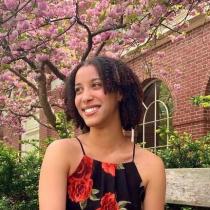
Institution: Bucknell University
Career Level: Undergraduate
NIDCD Mentor and Laboratory: Nicole Folan, Section on Sensory Cell Biology
Research Summary: I am a pre-med sophomore college student majoring in biology and minoring in neuropsychology. This summer, my work involved investigating pro-survival pathways against ototoxic drugs within the inner ear. The purpose of my research was to investigate the timing of the protective pathway once a receptor called toll-like receptor 4 (TLR4) responds to LPS, its natural ligand. I performed a western blot analysis on immortalized macrophage cells and auditory cells. I also analyzed immunocytochemistry on mouse utricles, a proxy for the hearing organ. Understanding the activation pathway of TLR4 will give us more information about the timing and molecular mechanism of the pro-survival pathway within the inner ear, leading to possible therapeutics for patients taking lifesaving yet ototoxic drugs.
Why did you decide to apply for the internship or award?
I thoroughly enjoyed my experience with the NIH High School Scientific Training and Enrichment Program (HiSTEP) and knew that I wanted to move forward with more hands-on research. I was interested in working in a lab where I could learn about clinical research as well as the benchwork that leads up to it.
What did you gain from the experience?
I greatly valued the opportunity to work alongside scientists at different levels of expertise. Directly collaborating with a postbac around my age and then checking in with an astounding principal investigator showed me where I could be in the near future as well as what I could aspire to be in the long run.

